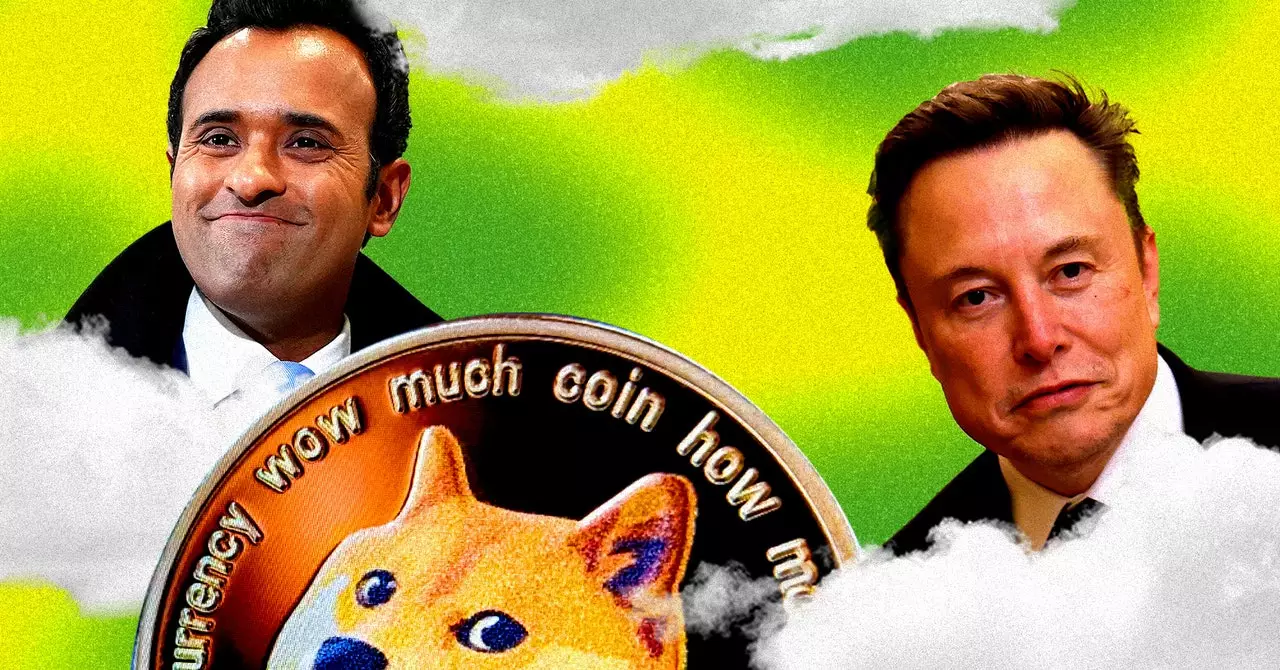In the ever-evolving discussions surrounding technology and its implications for society, one of the latest intriguing concepts to gain traction is the Department of Government Efficiency (DOGE). Recently popularized in tech conversations, DOGE navigates the labyrinth of bureaucracy and cryptocurrencies, putting forth intriguing inquiries into how these notions intersect. This article aims to scrutinize the implications of DOGE while drawing parallels to Dave Chappelle’s portrayal of the absurdity within the broligarchy—a term that encapsulates the dominating male influence pervasive in tech dialogues.
At the crux of the DOGE phenomenon lies the juxtaposition between humor and monetary systems. Originally birthed as a meme coin, Dogecoin epitomizes the light-heartedness and ridicule surrounding the cryptocurrency market. It’s a tongue-in-cheek reaction to an industry often criticized for its volatility and speculative nature. Using a laughable depiction of the Shiba Inu dog, Dogecoin garnered a cult following, propelled by endorsements from high-profile figures like Elon Musk. However, cryptocurrency being grounded in humor also raises existential questions about value and trust in digital currencies.
The very existence of meme coins such as Dogecoin, BONK, and FLOKI signals a deviation from traditional finance, where value is dictated by utility and trust. By contrasting serious financial instruments with whimsical counterparts, we are compelled to question the essence of economic systems. This playful interaction emphasizes the absurdity existing at the heart of cryptocurrency’s popularity, challenging conventional paradigms.
Turning to the Department of Government Efficiency, DOGE morphs from its meme coin origin into a concept seeking to instigate systemic reforms within government operations. The notion proposes a blend of creative thinking with a pragmatic approach to governance. This sharp pivot evokes thoughts about how humor and offbeat ideas could infiltrate serious arenas like public policy.
The evolution from playful experimentation in currency to a serious proposal for government efficiency symbolizes a wave of innovation where creativity thrives alongside institutional rigidity. DOGE’s creators leverage the meme’s power to bootstrap discussions surrounding bureaucratic reform. By demystifying government structures, DOGE offers a fresh lens through which citizens can engage with their governance, merging the digital and public sectors in unexpected ways.
Players in the Broligarchy
A salient feature of this phenomenon is the cast of characters involved in the broligarchy—those driving the discourse in tech. Analyzing figures like Elon Musk, a veritable catalyst for both meme coin proliferation and the DOGE proposal, reveals how power dynamics play a role in shaping societal norms and technological advancement.
The broligarchy notion suggests that these conversations are often dominated by a specific demographic, enabling an environment where attempts to redefine currency, governance, and society arise, albeit often through a lens of privilege. Thus, it is critical to evaluate how egalitarian these platforms are and who ultimately benefits from the disruptive ideas being circulated.
As we stand at the intersection of tradition and innovation, the trajectory of DOGE holds implications for broader societal dialogues. The idea of reinventing government efficiency through meme culture leaves us pondering the essence of economic and administrative frameworks. Clarity and understanding may emerge from chaos, and humor’s undeniable influence suggests an uncharted territory still to be explored.
Moreover, understanding the themes woven into the fabric of DOGE forces us to confront our collective futures. Can an ethereal concept—rooted in nonsense—actually lead to substantial reform? The exploration of such possibilities paints a landscape reflecting the aspirations and pitfalls inherent in the tech world.
The Department of Government Efficiency, born from the whims of meme culture and the undeniable influence of the broligarchy, evokes critical questions about the interplay between humor, power, and governance. As we navigate these new waters, the conversation surrounding DOGE challenges us to advance our thought processes and embrace innovative models of governance that encourage creativity while dismantling traditional structures. Whether this experiment thrives or fails remains to be seen, but one thing is certain: the dialogue it inspires is invaluable to the evolution of public discourse in the tech age.

